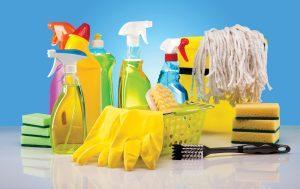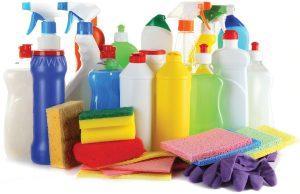 Take a look around your house. How many different materials do you see? In your kitchen alone you may have wood: painted and unpainted, tile; glazed and unglazed, natural stone surfaces, man-made plastics and acrylics, sinks of stainless steel or porcelain, appliances that are white, bisque, black or stainless steel, glass: door inserts, cooking surfaces and windows! How do you clean these surfaces?
Take a look around your house. How many different materials do you see? In your kitchen alone you may have wood: painted and unpainted, tile; glazed and unglazed, natural stone surfaces, man-made plastics and acrylics, sinks of stainless steel or porcelain, appliances that are white, bisque, black or stainless steel, glass: door inserts, cooking surfaces and windows! How do you clean these surfaces?
Household cleaners can be grouped according to strength, purpose and their cleaning mechanism. Cleaners are abrasives, solvents, bleaches, detergents; they can be acids or alkalis. The list can be refined according to the strength of the cleaner. For routine household cleaning you will want to use the most gentle and least hazardous cleaners first.
Most of what soils our homes will dissolve in water, the universal solvent. Keep in mind that wood can warp, and water can leave a white stain on finished wood. Textiles can shrink, some materials will mildew and paper products might disintegrate! Water should not be used as a cleaner around electrical components because of the risk of electrical shock! Water is the mildest solvent.
 To remove oils and other stains that do not dissolve in water there are stronger organic solvents: acetone, denatured alcohol, petroleum distillates including kerosene, mineral spirits, naphtha, dry cleaning fluid, and turpentine. Organic solvents are sometimes incorporated in polishes, degreasers and multi-purpose cleaners. Many solvents are caustic, flammable or combustible so take extra when using them.
To remove oils and other stains that do not dissolve in water there are stronger organic solvents: acetone, denatured alcohol, petroleum distillates including kerosene, mineral spirits, naphtha, dry cleaning fluid, and turpentine. Organic solvents are sometimes incorporated in polishes, degreasers and multi-purpose cleaners. Many solvents are caustic, flammable or combustible so take extra when using them.
Abrasives are mechanical cleaners. These cleaners scratch off dirt and stained material. Mild abrasives: baking soda and salt, which has a larger particle size, are common household items. Abrasives change the gloss and texture of your surfaces. Apply mild abrasives of this kind with a white nylon mesh pad. Moderate abrasives are fine pumice and fine steel wool. In all cases and do not apply too much pressure.
Acid cleaners which neutralize alkalis; may have bleaching effects. Alkali cleaners work by removing and suspending stains and grease which can then be rinsed away. Baking Soda is a mild alkali and be used as a solution or as a paste. Lemon Juice is a mild acidic cleaner which is useful for dissolving hard water deposits on glass. Try lemon juice on mild rust and soap film.
Mild detergents like hand and dish washing soaps act as surfactants which help release the stain from the surface you are cleaning. Laundry detergents are stronger, use them with caution as some are very alkaline. Strong alkaline products, and strong acids, can be very dangerous if mis-used.
IMPORTANT INFORMATION: Never mix cleaning products – some combinations create deadly fumes. Always protect your skin and especially your eyes. When you use strong cleaners please follow the precautions on the product container. If you use strong cleaners take care to remove any residue, especially if pets or children may be in contact with these surfaces. Keep nearby surfaces protected from cleaning products that are not suitable to use directly on them. Some cleaners will etch metal surfaces.
You’ve heard of the cleaner “elbow-grease” and you know the mechanism that makes elbow-grease work – your effort! Regular cleaning with mild products with save time, money and elbow-grease! ![]()
Martha Fenner • Kitch-Encounters
2740 Capital Circle NE – Tallahassee FL – 850-386-6555



